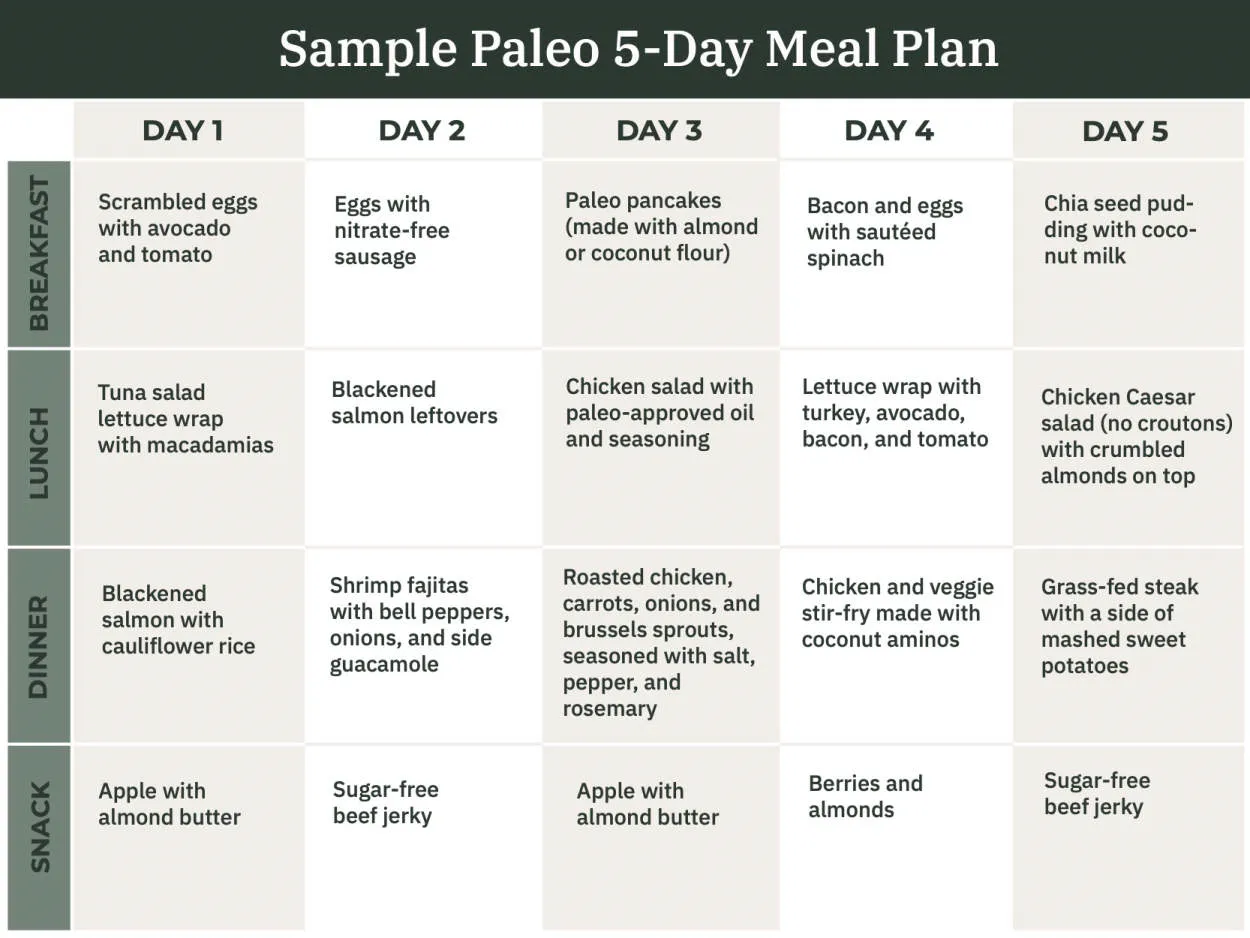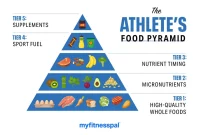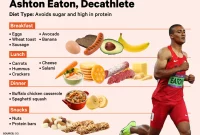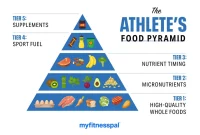Looking to optimize your performance as an athlete? Consider adopting a Paleo diet. The Paleo diet focuses on consuming whole, unprocessed foods that mimic our ancestors’ eating habits. By eliminating processed foods and focusing on lean proteins, healthy fats, and nutrient-rich fruits and vegetables, athletes can benefit from improved energy levels, quicker recovery times, and enhanced overall performance.
The Basics of Paleo Eating for Sports
Athletes are constantly looking for ways to optimize their performance and enhance their recovery. One approach that has gained popularity in recent years is the Paleo diet. The Paleo diet is based on the premise of eating foods that our ancestors consumed during the Paleolithic era. This means focusing on whole, unprocessed foods and avoiding grains, legumes, dairy, and refined sugars. Here are some basic principles of Paleo eating for athletes to consider:
1. Emphasize Protein
Protein is essential for muscle growth, repair, and recovery. Include ample amounts of quality protein sources in your diet, such as lean meats, fish, eggs, and nuts. These foods provide the necessary amino acids to support athletic performance.
2. Load Up on Fruits and Vegetables
Fruits and vegetables are packed with vitamins, minerals, and antioxidants that can help reduce inflammation and support overall health. They provide a good source of carbohydrates for energy and also contribute to proper hydration.
3. Healthy Fats Are Your Friend
Incorporating healthy fats into your diet can enhance satiety, support hormone production, and provide a source of sustained energy. Include foods like avocados, nuts, seeds, and olive oil to ensure an adequate intake of these beneficial fats.
4. Stay Hydrated
Proper hydration is crucial for athletes. Water should be your primary beverage, but coconut water can also be a good option for replenishing electrolytes. Avoid sugary sports drinks and sodas, as they can contribute to inflammation and disrupt performance.
5. Plan Your Meals and Snacks
Meal planning is key to maintaining a Paleo eating routine. Prepare meals and snacks ahead of time to ensure you have nutritious options readily available. This will help you steer clear of processed and unhealthy foods.
6. Listen to Your Body
Every athlete is unique, and there is no one-size-fits-all approach to nutrition. Pay attention to your body’s responses to different foods and adjust your diet accordingly. Experiment with the Paleo diet and make modifications that work best for your individual needs and performance goals.
Balancing a Paleo Diet for Athletic Demands
Athletes often aim to optimize their performance through various diet plans. One popular approach is the Paleo diet, which focuses on consuming unprocessed, whole foods that our ancestors would have eaten. While the Paleo diet can provide numerous benefits for athletes, it is essential to strike a balance to meet their unique nutritional requirements.
1. Prioritize High-Quality Protein Sources
Protein plays a crucial role in muscle repair and growth, making it vital for athletes. When following a Paleo diet, focus on incorporating lean sources of protein such as lean meats, fish, eggs, and nuts. These foods offer essential amino acids to support optimal performance and recovery.
2. Include Sufficient Carbohydrates
Carbohydrates are a primary fuel source for athletic activity. While the Paleo diet restricts grains and legumes, athletes should ensure they consume enough carbohydrates from sources like fruits, sweet potatoes, and root vegetables. These foods provide energy for intense workouts and aid in glycogen replenishment.
3. Emphasize Healthy Fats
Healthy fats are crucial for providing sustained energy and supporting overall health. Foods like avocados, nuts, seeds, and olive oil can be incorporated to ensure an adequate intake of essential fatty acids. These fats also possess anti-inflammatory properties, assisting in recovery and reducing exercise-induced inflammation.
4. Don’t Forget About Micronutrients
Athletes have increased nutrient demands due to their higher levels of physical activity. While the Paleo diet encourages whole foods, it’s important to ensure a sufficient intake of vitamins and minerals. Including a variety of colorful fruits and vegetables can provide essential micronutrients required for optimal athletic performance.
5. Maintain Hydration
Proper hydration is crucial for athletes to prevent fatigue and maintain performance. Water should be the primary beverage choice, and athletes should drink enough to replace fluid losses during exercise. Electrolyte-rich drinks may also be necessary for extended and intense workouts.
6. Individualize and Monitor
Every athlete is unique, and their dietary needs may vary. It is crucial to individualize the Paleo diet according to personal preferences, training demands, and performance goals. Regular monitoring of energy levels, body composition, and performance can help adjust the diet to optimize results.
By balancing a Paleo diet with the specific nutritional needs of athletes, it is possible to reap the benefits of this dietary approach while maximizing athletic performance and recovery.
Meal Planning and Prep for Paleo Athletes
Paleo diet has gained popularity among athletes for its ability to provide optimal nutrition for performance and recovery. To fully harness the benefits of a paleo diet, proper meal planning and preparation are crucial. Here are some essential considerations when it comes to meal planning and prep for paleo athletes:
1. Prioritize Whole Foods
When planning your meals, focus on incorporating whole, nutrient-dense foods such as lean meats, fish, eggs, vegetables, fruits, nuts, and seeds. These foods are rich in essential nutrients and can support muscular development, energy production, and overall well-being.
2. Choose Quality Protein Sources
Protein is crucial for muscle repair and growth. Opt for high-quality sources of protein like grass-fed beef, free-range poultry, wild-caught fish, and organic eggs. These sources are not only richer in essential nutrients but also free from hormones and antibiotics.
3. Include Healthy Fats
Fats are an essential part of the paleo diet for athletes as they provide sustained energy and aid in nutrient absorption. Incorporate healthy fat sources like avocados, coconut oil, olive oil, nuts, and seeds into your meals to support optimal performance.
4. Plan Balanced Meals
Balance your meals with a combination of protein, vegetables, and healthy fats. This will provide a steady release of energy and help maintain stable blood sugar levels. Experiment with different recipes and food combinations to keep your meals exciting and satisfying.
5. Prepare in Advance
To ensure consistency and convenience, spend time each week planning and prepping your meals. Batch cook proteins, chop vegetables, and portion out snacks to have readily available during busy training days. This will help you stay on track with your paleo diet and avoid relying on unhealthy convenience foods.
6. Stay Hydrated
Hydration is crucial for athletes to maintain optimal performance. Adequate water intake is essential for energy production, nutrient absorption, and overall recovery. Make sure to drink enough water throughout the day and especially during strenuous workouts.
By prioritizing whole foods, quality protein sources, healthy fats, and balanced meals, while also planning and prepping in advance, paleo athletes can optimize their performance and reap the benefits of a paleo diet. Remember to consult with a nutritionist or healthcare professional to personalize your meal plan based on your specific needs and goals. Fuel your body with the right nutrients and conquer your athletic endeavors!
The Pros and Cons of Paleo for Performance
When it comes to optimizing performance, athletes are constantly searching for the most effective dietary strategies. One approach gaining popularity is the Paleo diet, which is based on the eating habits of our ancient ancestors. The Paleo diet emphasizes consuming whole, unprocessed foods and excludes grains, legumes, dairy, and processed sugars. While it has its benefits, there are also some drawbacks to consider.
Pros of Paleo for Performance:
- Improved nutrient density: By focusing on whole, unprocessed foods, the Paleo diet provides a wide range of essential nutrients that support optimal performance and overall health.
- Reduced inflammation: By eliminating grains and processed sugars, the Paleo diet can help reduce inflammation in the body, which may aid in recovery and performance.
- Stabilized energy levels: The emphasis on protein and healthy fats in the Paleo diet can provide athletes with sustained energy throughout their training sessions or competitions.
- Weight management: Many athletes find that following a Paleo diet helps them maintain a healthy body weight, which can positively impact performance in certain sports.
Cons of Paleo for Performance:
- Restricted carbohydrate intake: The Paleo diet limits the consumption of starchy vegetables and grains, which can be a disadvantage for athletes needing higher carbohydrate intake for sustained energy during endurance activities.
- Potential micronutrient deficiencies: Excluding grains and dairy from the diet may result in lower intakes of certain essential nutrients like calcium and vitamin D, which are important for bone health.
- Difficulty with social situations: Following a strict Paleo diet can be challenging when dining out or attending social events where the available food choices may not align with the diet’s restrictions.
In conclusion, the Paleo diet can offer several benefits for athletes looking to optimize their performance, such as improved nutrient density and reduced inflammation. However, it’s important to consider the potential drawbacks, including restricted carbohydrate intake and possible micronutrient deficiencies. Ultimately, athletes should carefully evaluate their individual needs and consult with a healthcare professional or registered dietitian before adopting any specific dietary approach.
Success Stories of Athletes on Paleo Diet
The Paleo diet has gained popularity among athletes looking to optimize their performance and enhance their overall health. Many successful athletes have reported significant improvements in their performance and well-being after adopting the Paleo diet. Here are a few inspiring success stories:
1. LeBron James – NBA Superstar
LeBron James, one of the greatest basketball players of all time, credits the Paleo diet for his sustained energy levels and improved stamina on the court. By eliminating processed foods and focusing on whole, nutrient-dense foods, James has experienced increased muscle mass, reduced inflammation, and better recovery after intense games.
2. Rich Froning – CrossFit Champion
Rich Froning, a four-time CrossFit Games champion, follows a strict Paleo diet to fuel his demanding training regimen. By consuming lean meats, vegetables, fruits, and healthy fats, Froning has achieved optimal body composition and sustained high performance throughout competitions. The Paleo diet has also helped him recover quickly from intense workouts.
3. Serena Williams – Tennis Icon
Serena Williams, the legendary tennis player, attributes her success on the court to a clean diet that aligns with Paleo principles. By eliminating processed sugars and grains, Williams has experienced improved digestion, reduced bloating, and enhanced mental clarity during matches. The Paleo diet has also provided her with the sustained energy needed for long, grueling matches.
These success stories demonstrate the potential benefits of adopting a Paleo diet for athletes. While individual results may vary, many athletes have reported improved performance, increased energy levels, and enhanced overall health from following this ancient dietary approach.
Conclusion
In conclusion, incorporating a Paleo diet can greatly optimize performance for athletes. The emphasis on whole, unprocessed foods and the elimination of grains and processed sugars can lead to improved energy levels, enhanced muscle recovery, and increased overall fitness. By fueling the body with nutrient-dense choices, athletes can experience enhanced endurance, strength, and stamina. The Paleo diet offers a natural and effective way to support athletic performance and achieve peak results.




